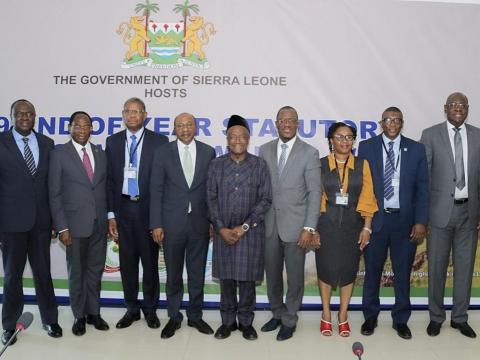By Francis H. Murray
The West Africa Monetary Agency (WAMA) and its sister bodies on Friday February 14 ended a two weeks long engagement on a road map to monetary union and other related issues in the region. The conference has been ongoing at the Radison Blu Mammy Yoko Hotel in Freetown.
The other participants were drawn from the West African Monetary Institute (WAMI) and the West African Institute for Financial and Economic Management (WAIFEM).
The conference, which started on Thursday 6th February, featured discussions on the planned adoption of a single currency in Anglophone West Africa, as well as ensuring continued economic recovery and stability in the region.
Director General of WAMA, Momodu Bamba Saho, noted during the opening ceremony that there had been great improvements in economic activities among ECOWAS member states in 2019, despite global economic challenges.
“The region is home to some of the fastest growing economies in the world. Three member states, Benin (7.6%), Cote d’lvoire (7.5%) and Ghana (7.1%) grew by over 7.0 percent in 2019. Twelve member states are expected to grow by 5.0 percent or more in 2020,” he said.
Saho also said member states “made some progress in their compliance with microeconomic convergence criteria in the first half of 2019 with six meeting the primary criteria compared to 5 in the first half of 2018.”
According to Saho, although sustained achievement of all four primary convergence criteria remained unrealistic, member states had made projections to meet all the primary criteria at end-2019 compared to only two at end-2018.
‘‘Although compliance with the convergence criteria has improved, member states need to continue to strengthen policy implementation in order to comply with the convergence criteria and lay a strong basis for the establishment of monetary union,” he said.
He then urged the member states to prioritize economic diversification and structural reforms that would foster private sector growth thereby realizing the tremendous potential of the region and to achieve the objective of the monetary cooperation programme.
In his keynote address, the Governor of the Bank of Sierra Leone, Prof. Kelfala Kallon, said the deliberation would be taken note of in light of the implementation of the revised roadmap, citing the commitments made by state authorities to establish a monetary union by 2020.
He noted that the selection process of countries that would qualify for accession to monetary union would be subject to the evaluation of the state of readiness of member states.
“As we get closer to decision point, I concede that this meeting is taking place at a period characterized by socio-political and economic developments and uncertainties, both global and domestic,” he said, whiles citing the challenges the country’s economy was faced with, which range from a subdued real sector, price instability to excesses in fiscal policy.
Governor Kallon said that Sierra Leone’s macroeconomic fundamentals had improved modestly because of the implementation of stringent policy measures geared towards promoting all-inclusive growth, restoring macroeconomic stability and debt sustainability through structural reforms, fiscal consolidation and a viable external sector.
‘‘Consequently, real GDP growth accelerated to 5.1 percent in 2019, from 3.5 percent in 2018. Inflationary pressures also continued to trend downwards in the right direction to 13.9 percent at December 2019, after having peaked at 16.6 percent in April 2019,” he said.
The discussions over the last two weeks have been centered around several institutions within the ECOWAS Monetary Cooperation Programme.
A technical meeting for Governors of the Central Banks of the member countries was also organized to understand common challenges and share solutions.
Copyright © 2020 Politico Online








